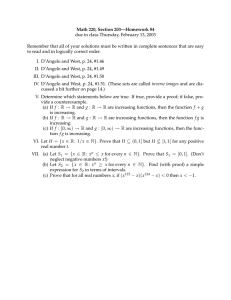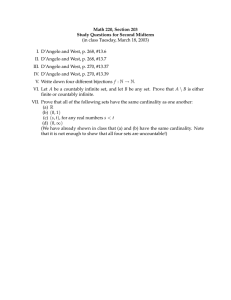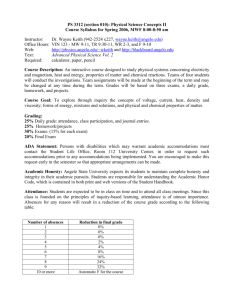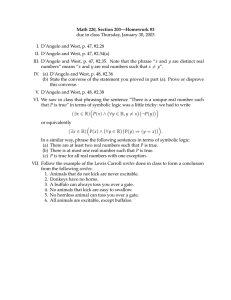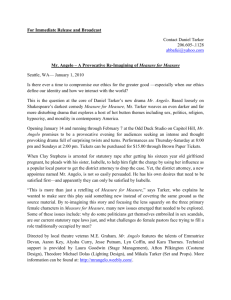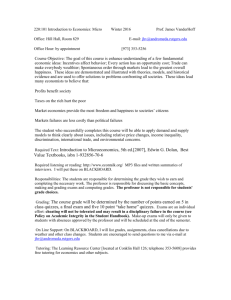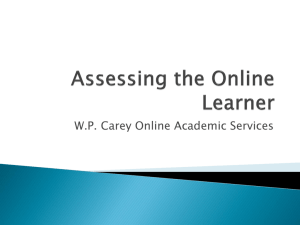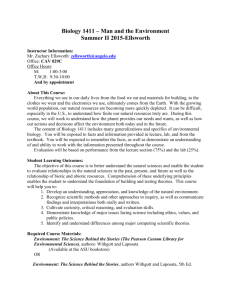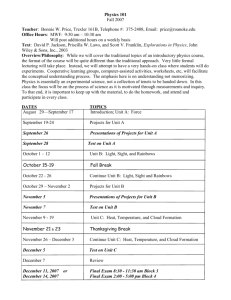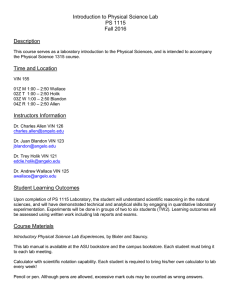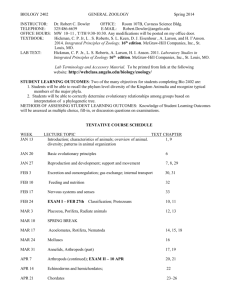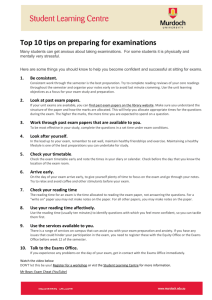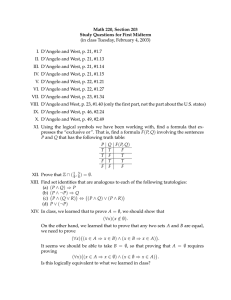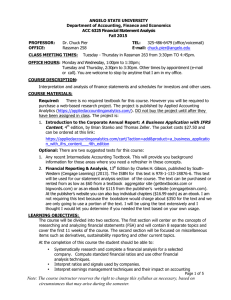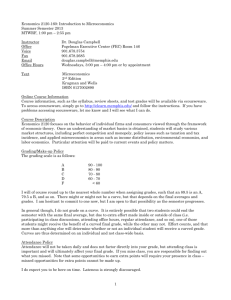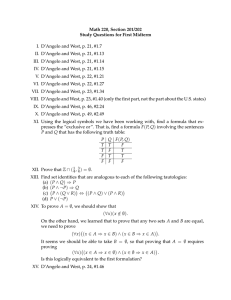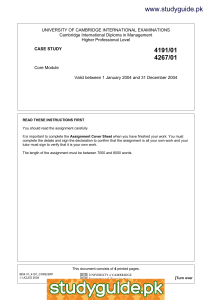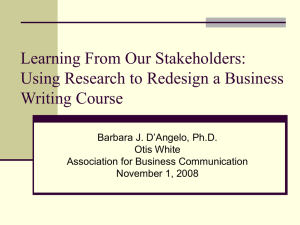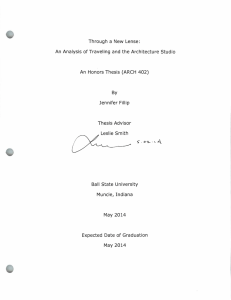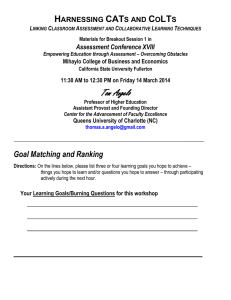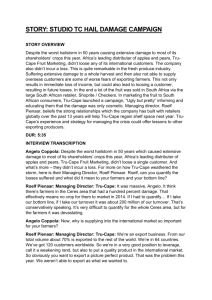BIOLOGY 1410 * HUMAN BIOLOGY
advertisement
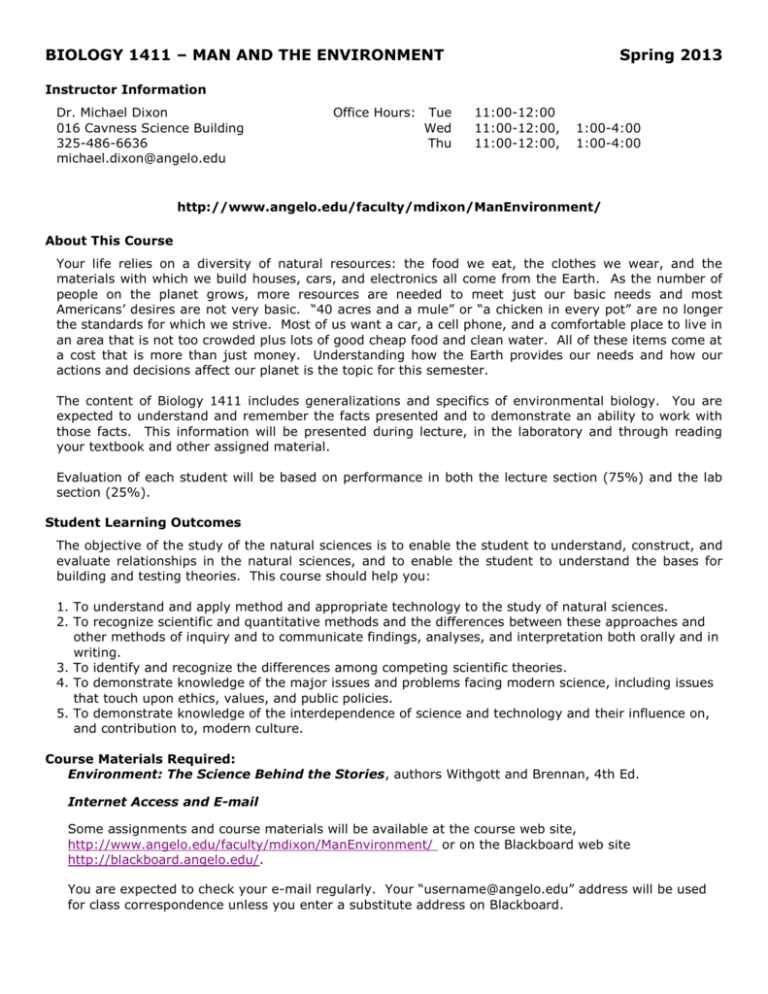
BIOLOGY 1411 – MAN AND THE ENVIRONMENT Spring 2013 Instructor Information Dr. Michael Dixon 016 Cavness Science Building 325-486-6636 michael.dixon@angelo.edu Office Hours: Tue Wed Thu 11:00-12:00 11:00-12:00, 11:00-12:00, 1:00-4:00 1:00-4:00 http://www.angelo.edu/faculty/mdixon/ManEnvironment/ About This Course Your life relies on a diversity of natural resources: the food we eat, the clothes we wear, and the materials with which we build houses, cars, and electronics all come from the Earth. As the number of people on the planet grows, more resources are needed to meet just our basic needs and most Americans’ desires are not very basic. “40 acres and a mule” or “a chicken in every pot” are no longer the standards for which we strive. Most of us want a car, a cell phone, and a comfortable place to live in an area that is not too crowded plus lots of good cheap food and clean water. All of these items come at a cost that is more than just money. Understanding how the Earth provides our needs and how our actions and decisions affect our planet is the topic for this semester. The content of Biology 1411 includes generalizations and specifics of environmental biology. You are expected to understand and remember the facts presented and to demonstrate an ability to work with those facts. This information will be presented during lecture, in the laboratory and through reading your textbook and other assigned material. Evaluation of each student will be based on performance in both the lecture section (75%) and the lab section (25%). Student Learning Outcomes The objective of the study of the natural sciences is to enable the student to understand, construct, and evaluate relationships in the natural sciences, and to enable the student to understand the bases for building and testing theories. This course should help you: 1. To understand and apply method and appropriate technology to the study of natural sciences. 2. To recognize scientific and quantitative methods and the differences between these approaches and other methods of inquiry and to communicate findings, analyses, and interpretation both orally and in writing. 3. To identify and recognize the differences among competing scientific theories. 4. To demonstrate knowledge of the major issues and problems facing modern science, including issues that touch upon ethics, values, and public policies. 5. To demonstrate knowledge of the interdependence of science and technology and their influence on, and contribution to, modern culture. Course Materials Required: Environment: The Science Behind the Stories, authors Withgott and Brennan, 4th Ed. Internet Access and E-mail Some assignments and course materials will be available at the course web site, http://www.angelo.edu/faculty/mdixon/ManEnvironment/ or on the Blackboard web site http://blackboard.angelo.edu/. You are expected to check your e-mail regularly. Your “username@angelo.edu” address will be used for class correspondence unless you enter a substitute address on Blackboard. Attendance You are expected to attend all lecture and lab periods. The single most important thing you can do to get a good grade in this course is to show up. I will take attendance regularly by passing out a sheet for you to sign or by having you turn in an assignment. Quizzes and other in-class activities may not be made up. You will get a zero on the assignment if you are not present. Exams There will be four exams given during the semester, including a final exam. Each examination will include information presented in class and out of your textbook. Each test will be comprehensive - that is it will include material presented at any time during the course. This is unavoidable because early topics of discussion are built upon and expanded as the course progresses. Exams will be mostly multiple-choice but may include a few short answer questions. Exams will cover material covered up through the last class day before the exam. The final exam will be approximately twice the length and number of points as the previous exams. Missing an exam is a very serious matter. If you have a documented legitimate excuse, such as severe personal illness, a death in your family, or a university-sponsored event, you must notify me before the exam or very promptly afterward. I will work with you if you act responsibly. If you miss an exam for any other reason or do not notify me promptly then I will use the score you get on the final exam to replace ONE missing exam grade. You will receive a zero if you miss more than one exam. As a reward to those of you who put in the necessary work, the final exam is optional if you have an “A” average in all of your work at the end of the semester. This includes both the lab and lecture portions of this course. Laboratory Lab attendance is mandatory. Any lab you miss due to an unexcused absence cannot be made up, and for that lab you will receive a zero. If you are unsure about the validity of your excuse, please visit with your scheduled lab instructor. Any student who misses his/her regularly scheduled lab has only one chance to make it up. You must have written permission to attend the make-up lab. The make up lab each week begins at 1:00 pm on Friday (of the same week), in room 014 of the Cavness Science Building. Special Needs Angelo State University cannot require a student to disclose that they have a disability. However, if you have a disability that requires special accommodation, you should contact the Office of Student Life, Room 100 in the Hardeman Building, phone 942-2191. ASU Faculty have been instructed by the University that “in order to maintain consistency in services across campus”, we are to provide no accommodation without authorization from the Office of Student Life. Final Grade Calculation Your grade in this course will be determined by adding together all of the points you earn on your tests, quizzes and any other assignments and then dividing this number by the total number of points possible. “Extra credit or bonus” assignments will be added in to the total you earned without adding them into the number of possible points. This will be your lecture average. It is worth 75% of your course grade. All of the scores on your laboratory exercises will be averaged together to determine your laboratory average. This is worth 25% of your course grade. Withdrawal From the Course You are not automatically withdrawn from a course if you stop attending. If you stop attending and do not withdraw I am required to submit a grade for you. This “F” cannot be removed. Lecture Topics Topic Chapter Introduction, Syllabus 1 Methods and limitations of science 1 Chemistry and Energy 2 Life and It’s Interactions 3&4 Human Populations 8 Agriculture, Biotechnology 9, 10 Biodiversity 11 Additional chapters, pages and readings will be announced Test Schedule Exam 1 Intro – Evolution Exam 2 Evolution - Populations Exam 3 Populations – Agriculture Final Exam Feb 7, 8 Mar 7, 8 Apr 10, 11 EVERYTHING! Section 020, MWF 10:00 Monday, May 6, 10:30 AM Section 030, TR 9:30 Thursday, May 9, 8:00 AM
